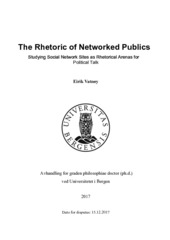| dc.description.abstract | As social network sites have become a central part of the modern media landscape, they have also become important arenas for political talk between citizens. The possibilities these new arenas offer for social interaction and public participation have generated what social theorists describe as a restructuring of publics into “networked publics”. Numerous studies and theories suggest how the emergence of networked publics influences political participation and democracy. Still, we know little about the nature of discourse in these arenas and how they shape rhetorical practice. This dissertation explores the rhetoric of networked publics by studying the practices and experiences of expert citizens on Twitter and Facebook in Norway. It asks: What characterizes social network sites as rhetorical arenas? And what characterizes political rhetoric on social network sites? The dissertation adds to the growing research literature on vernacular rhetoric and political talk in everyday settings, and offers new ways to explore these perspectives in qualitative studies of online political discourse. Theoretically, it combines perspectives from the fields of rhetoric, political communication and sociology in a new framework designed to analyse and describe how changes in technological and social circumstances affect rhetorical action. The main empirical contribution is a series of 32 in-depth interviews with “expert citizens”. The informants are identified through a snowball sampling process as central actors in a network of well-established voices from the media, politics and academia that use Twitter and Facebook as arenas for political talk and public debate. An analysis of these interviews yields the users’ own experiences that bring new dimensions to our understandings of rhetorical practice in these arenas and to how they shape political talk. Through four thematically separate chapters the analysis of the interviews demonstrates how: 1) the informants see themselves as part of socially and discursively distinguishable networked publics described as the “tweetocracy” and the “Facebook-public”; 2) these networked publics are believed to sustain local argument cultures that separate them from both formal political processes and “ordinary” citizens; 3) these networked publics facilitate a particular kind of individualization of political debate, as they promote strong connections between people’s identities and political convictions; 4) these networked publics are preoccupied with “social mediafriendly issues” that are easy to personalize and bring attention to political identities and values. The empirical study is concluded with an analysis of the viral spread of the hashtag #ihaveexperienced on Twitter in the spring of 2015. Here, text analysis is used to explore topical and discursive structures that are suggested in the interviews. The analysis illustrates how the particular kind of individualization that social network sites facilitate plays out in a situation revolving around a typical social media-friendly issue. It thus exemplifies how insights gathered from interviews can inform and inspire rhetorical text analyses. Drawing on basic insights from theories of structuration, the dissertation outlines how social network sites can be studied as “rhetorical arenas” and analysed as practice on the meso-level. This represents an alternative to analyses of rhetorical genre and rhetorical community. By paying more attention to social and technological conditions for rhetorical practice, this approach is better suited for studies of environments in which situational circumstances are fragmented and continuously changing. The dissertation also offers a new understanding of political rhetoric that includes the different forms of political and civic behaviour found in online environments as well as more traditional forms of political engagement. This understanding of political rhetoric includes perspectives on deliberation, framing and agenda-setting, and epideictic rhetoric, within the same conceptual framework, and opens new ways to understand the political potential of participatory media. | en_US |
